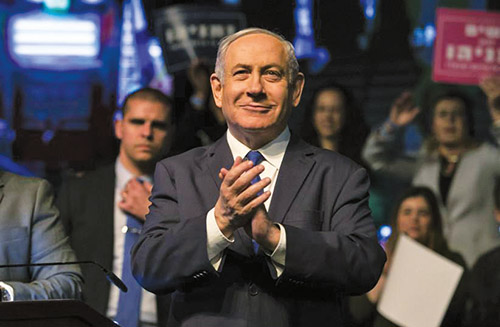
As things stand, the opposition leader’s right-religious bloc will pick up 65 seats in the 120-seat Knesset, although the electoral map can still change as about a half million “double envelope” ballots need to be processed.
With more than 4.1 million votes officially counted, or nearly 86% of the total ballots cast in
Israel’s elections on Tuesday, November 1, opposition leader Benjamin Netanyahu’s right-religious bloc appears primed for a victory.
According to Central Elections Committee (CEC) figures released the next day, Netanyahu’s bloc will pick up 65 seats, though this number and the prospective electoral map could still change if the far-left Meretz and anti-Zionist Arab Balad parties enter the Knesset.
Both parties are currently sitting below the minimum 3.25% electoral threshold to enter the next parliament, although the CEC still needs to count some 500,000 “double envelope” ballots. These are essentially absentee ballots, cast primarily by diplomats, soldiers and prisoners outside of assigned polling stations, which are determined automatically in the voter registry based on one’s place of residence.
As things stand, Netanyahu’s Likud Party was projected to receive 32 seats, with his likely coalition partners the Religious Zionist Party, Shas and United Torah Judaism receiving 14, 11 and eight mandates, respectively.
Prime Minister Yair Lapid’s Yesh Atid was predicted to garner 24 seats, followed by Defense Minister Benny Gantz’s National Unity at 12. Yisrael Beytenu, the Islamist Ra’am and the predominantly Arab Hadash-Ta’al were all sitting at five seats. The Labor Party would take four seats.
The CEC’s partial results thus far confirm exit polls, which predicted Netanyahu’s return to the Prime Minister’s Office.
Netanyahu early on Wednesday hailed his bloc’s apparent victory and thanked his supporters for their “magnificent expression of faith.”
“It’s become clear once again that the Likud is the largest party in Israel, above all the other parties by a wide margin,” the opposition leader said.
The nation, he continued, “wants another way. It wants security. It wants to lower the cost of living. It wants strength. It doesn’t want shame. It doesn’t want to lower its head. It wants an upright stance. It wants political understanding, but with firmness.”
He added: “You know what else it wants? To return the national pride that was taken from us. And this we’ll bring as well.”
Israeli President Isaac Herzog will by November 8 designate a candidate to form a government, and that candidate will almost certainly be Netanyahu.
The Likud leader, who served as premier from 1996-1999 and again from 2009-2021, would then have four weeks to form a coalition, with the possibility of a two-week extension.
This was where things stood at press time. All information above is subject to change.










